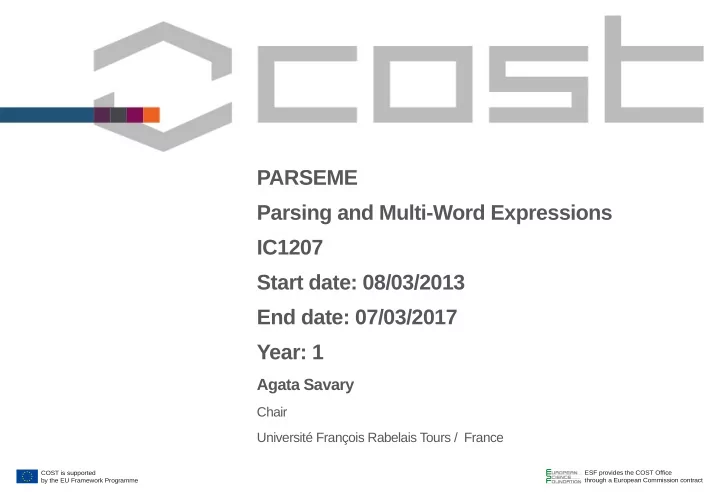

PARSEME Parsing and Multi-Word Expressions IC1207 Start date: 08/03/2013 End date: 07/03/2017 Year: 1 Agata Savary Chair Université François Rabelais Tours / France COST is supported ESF provides the COST Office by the EU Framework Programme through a European Commission contract
Scientific context and objectives (1/2) • Background / Problem statement: • Natural Language Processing (NLP): “understanding” and processing human texts by a computer (information extraction, machine translation, question answering, automatic text summarization, sentiment and opinion mining, human-machine dialogue, etc.) • Multi-Word Expressions (MWEs): sequences of words with unpredicted properties ( to count somebody in , to take a haircut , to kick the bucket ) • Brief reminder of MoU objectives: • To put multilingualism in focus of linguistic and technological studies. • To establish a long-lasting collaboration of Natural Language Processing (NLP) experts within a cross-lingual , cross-theoretical and cross-methodological research network . • To bridge the gap between linguistic precision and computational efficiency in NLP applications . 2
Scientific context and objectives (2/2) • Research directions: • Contrastive studies of MWE properties and treatment in different languages and frameworks. • Extending pre-existing language resources and tools (lexicons, grammars, treebanks, parsers) with MWEs. • New formalisms and best practices for cost-saving lexicon, grammar and treebank production methodologies. • Crossing borders between knowledge-based and data-driven methods. • Novelty: • First highly cross-lingual, cross-theoretical, and cross-methodological forum for MWEs in parsing. • 23 languages, 9 language families, 7 dialects 3
Working groups 1. Lexicon/Grammar Interface 2. Parsing Techniques for Multi-Word Expressions 3. Hybrid Parsing of Multi-Word Expressions 4. Annotating Multi-Word Expressions in Treebanks 4
Future Plan and Challenges (1/2) • Outreach: • Extending the number of partners, countries and languages • Public website addressed to a diverse public • Establishing a balanced collaboration with the MWE community outside Europe ( MWE Workshop ) • Networking : • Efficient organization of the Working Groups • Creating internal communication and management tools • Organizing 2 plenary scientific sessions and 9 STSMs 5
Future Plan and Challenges (2/2) • Scientific program: • Contrastive studies of the linguistic properties of MWEs in different languages. • Contrastive studies of the state-of-the-art parsing frameworks wrt. MWEs. • Contrastive studies of the state of the art in annotating MWEs in treebanks. • First steps towards extending existing resources and tools with MWEs. • Preparing evaluation testbeds. 6
Thank you 7
Recommend
More recommend